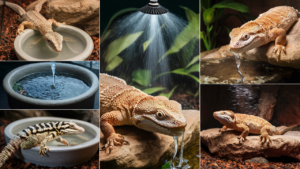Welcoming an exotic pet into your home is an adventure filled with unique challenges and rewards. This guide delves into the essentials of exotic pet care, exploring everything from species selection to health management. Prepare to embark on a thrilling journey of responsible and loving care for your extraordinary animal friend.
Discovering Exotic Pet Species and Their Unique Needs
Exotic pets, with their unique needs and behaviors, demand an in-depth understanding of their natural habitats to be properly cared for. Different species, ranging from reptiles and birds to small mammals, require distinct environments, diets, and enrichment to thrive. For example, reptiles such as snakes and lizards need specific temperature gradients in their enclosures for proper thermoregulation, while birds benefit from large cages that allow for flight and toys that cater to their natural foraging instincts.
The diet of an exotic pet is another critical area where knowledge and precision are necessary. Nutritional requirements can vary widely between species – herbivorous pets like certain reptiles may need a diet of fresh vegetables and specific supplements, whereas carnivorous birds such as parrots require a varied diet including seeds, fruits, and possibly insects, depending on the species.
Housing for exotic pets must replicate their natural environment as closely as possible to prevent stress and health issues. This includes appropriate substrates for reptiles that mimic their natural terrain, aviaries for birds that allow for natural flying patterns, and complex enclosures for small mammals that provide opportunities for burrowing, climbing, and other natural behaviors.
Moreover, environmental enrichment plays a crucial role in the well-being of exotic pets. Enrichment can range from physical structures like branches, rocks, and hiding places for reptiles, to cognitive toys that challenge birds or small mammals mentally. Understanding the innate behaviors of an exotic pet species is key to providing appropriate enrichment that can prevent boredom and encourage natural behaviors.
Understanding these various aspects of care highlights the importance of thorough research and preparation before taking on the responsibility of an exotic pet. It’s not only about creating a suitable living space but also about fostering an environment where these unique animals can lead happy, healthy lives.
Navigating the Legal Landscape of Exotic Pet Ownership
Before inviting an exotic pet into your home, navigating the complex regulations surrounding their ownership is essential. It’s not only about ensuring the legality of your pet but also about committing to ethical and responsible stewardship. The intricacies of permits and regulations vary significantly by region, thus requiring a potential owner to deeply investigate the specific legal framework of their locality.
In the United States, for instance, the legality of owning certain exotic animals can differ drastically from one state to another, with some states requiring specific permits and others outright banning the ownership of certain species. It’s critical to consult with local wildlife authorities or the Fish and Wildlife Service to obtain the most current information on what is permissible in your area.
Additionally, the Convention on International Trade in Endangered Species of Wild Fauna and Flora (CITES) plays a critical role in the international movement of exotic animals. It ensures that the international trade of wild animals and plants does not threaten their survival. Compliance with CITES regulations is not optional; it is a legal requirement for the international transportation of animals listed under its appendices.
The ethical implications of exotic pet ownership are equally significant. With the growing concerns about conservation and the wellbeing of exotic species, potential owners should contemplate not just the legality but the morality of keeping an exotic pet. It involves considering the species’ conservation status, its specific needs, and whether you can provide an environment that closely mimics its natural habitat, as discussed in the previous chapter.
Resources for staying compliant with these laws and regulations include websites of environmental and wildlife protection agencies, legal databases, and even forums and social media groups for exotic pet owners. Engaging with a community can provide firsthand insights and tips for navigating the legal landscape more smoothly.
Understanding the controversies and conservation concerns related to exotic pets is crucial for responsible ownership. Ownership should extend beyond personal satisfaction or fascination, embracing advocacy for the preservation of the exotic pet species. This commitment not only helps in ensuring the wellbeing of your pet but also contributes to the broader efforts in conservation and ethical treatment of these unique creatures.
Correct and responsible exotic pet ownership begins with a comprehensive understanding of both legal obligations and ethical considerations. By operating within the legal framework and advocating for ethical treatment and conservation, owners can ensure a safe, fulfilling life for their exotic companions, paving the way for a more informed and responsible approach to exotic pet ownership.
As we transition to the next chapter, focusing on the health, housing, and happiness of exotic pets, remember that the foundation of proper care begins with understanding and respecting the legal and ethical frameworks that govern exotic pet ownership. Ensuring the health and wellbeing of your exotic pet is not only a matter of selecting the right cage or understanding their dietary needs but also encompasses the broader responsibility of legal compliance and ethical stewardship.
Health, Housing, and Happiness: Setting Up the Perfect Exotic Pet Home
Transitioning from the complexities of legal ownership, caring for exotic pets demands a deep understanding of their unique health, housing, and happiness. Ensuring a thriving environment for these animals involves a commitment to regular veterinary check-ups, familiarization with species-specific health issues, and the creation of a living space that closely mirrors their natural habitats.
Health Needs: Exotic pets, with their diverse backgrounds, come with equally diverse health requirements. It’s imperative to find a vet specializing in exotic medicine, as they’ll offer invaluable insights into preventive care, nutrition, and early detection of diseases. Regular health assessments can help mitigate risks of common and exotic ailments, from dietary deficiencies to more complex conditions tied to their specific genetics.
Best Exotic Pet Cages: The ideal home for any exotic pet is one that balances safety with the stimulation of their natural environment. For arboreal species like certain reptiles and birds, vertical spaces that allow climbing are essential. Aquatic pets require tanks with precise water conditions, whereas desert dwellers benefit from temperature-controlled environments with appropriate heat sources. The materials—whether it be stainless steel, glass, or another safe, durable choice—should be selected with both the pet’s well-being and the ease of cleaning in mind.
Design is just as critical. Enclosures must be escape-proof yet accessible for cleaning and interaction. Size matters; many exotic pets require ample space to move, forage, or even fly, as restricted movement can lead to health and behavioral problems. Incorporating features like branches, rocks, or hiding places can encourage natural behaviors, contributing positively to both physical and psychological health.
Finally, maintaining a clean and suitable living space is crucial. This includes regular cleaning schedules to prevent the build-up of harmful bacteria or parasites, proper waste disposal, and the monitoring of environmental conditions such as humidity, temperature, and light. Each species has unique needs, making it essential to research and replicate their natural living conditions as closely as possible.
By addressing these components—health, housing, and setting—the path to a fulfilling life for your exotic pet becomes clearer. The intricacies of their care may initially seem daunting, but with dedication and the right resources, ensuring their well-being can be an immensely rewarding endeavor.
Conclusions
This guide has traversed the exhilarating world of exotic pet care, delivering insights into their diverse species, legal considerations, and essential requirements for a thriving habitat. Embrace the role of a dedicated guardian as you ensure the optimal health and happiness of your exotic pet, fostering a bond that enriches both your lives.



